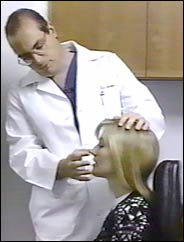
Last night I posted about the just-filed Allstate RICO suit, that includes charges that doctors and medical exam companies conspired with Allstate for “independent” sham exams and reports designed cut off treatment for patients. I also had written of a similar suit against State Farm.
Now, one of the defendant doctors responds:
——————————————————————————
 By Anonymous
By Anonymous
Part of the problem with McGee’s case is that he is under investigation by Allstate, Geico and State Farm for insurance fraud. This was explained to us by the carrier I am on the suit with. They further explained to us that by law they have the right and have exercised the right to freeze his payments since he was not cooperating with the investigation. They felt this is a retaliatory suit. If he felt so strong about his claims why did he not contact the attorney general? (I will answer that)….Because this case is about money….it is a civil case..bottom line dollars and cents.
I would also like to point out that Dr. McGee was on the DD panel for some time also performing IME’s. Personally, I feel that although I am named, I dictate all my reports, one by one verbatim. While they might sound a like and look a like, they are all done by me, my voice recording saved to back this up. As for the fee splitting every IME company in the industry uses the same method for payment.
As someone who performs IMEs I also treat a large amount of patients with private insurance and no fault (unsolicited). I apply my standard of care in my office setting to my IME setting. Over the past 15 years, I have gotten more praise from my patients then one doctor deserves. This is because I think I have always advised them to stay active with walking and swimming. I generally do not recommend physical therapy for more then a few months at a time. I find that staying fit, walking, swimming, home exercise programs and stress management are very useful tools for soft tissue injuries mainly neck pain and back pain. As an electro diagnostic consultant I do refuse to do EMG’s that do not enhance patient care; That was not popular with my partner(s). As an IME provider I have called claim reps over some serious issues. My most memorable being a man with a damaged prosthetic from an accident who on my 2nd IME still did not have it fixed due to the claim rep not approving it. I also have had to send claimants to emergency rooms more then once for possible cellulitis for surgeries a few days prior for injuries alleged to be from the accident I was evaluating them for. It certainly was not the popular thing to do but, first do no harm is the oath I stand by…I had 1 claimant who saw her doctor a day before who reported bowel and bladder issues and then when I examined them they had no rectal tone…I am sure you know what that means-another medical emergency!
I do admit that I do recommend no treatment after about 5 months only if there are no positive findings on physical examination. So many times these claimants are mislead that if they quit there jobs and feign pain that they will get a large amount of money. TO me this just breeds laziness. I would hope at that time there treating physician offers them encouragement, home exercise programs, healthy lifestyle tips etc…So many times I hear that there physician has literally dropped them.
No one has ever, ever, ever, asked me to change an opinion. The allegations of false reports is bogus and coming from John McGee who is famous for owning Bill Mills to me has no merit. Furthermore, on the Allstate summons page 34 paragraph 95 he mentions that the documents to prove this have not yet been discovered. That will not fly in a RICO case. I have already had the case reviewed by a half a dozen attorneys familiar with RICO who all agree that the elements needed for a true RICO case are not there. There needs to be a crime within a crime with hard evidence-not assumptions. This case has no concrete evidence just a bunch of assumptions.
I have a years worth of voice recordings to show my reports are authentically mine and I know that I have never excepted a bribe or for that matter have been offered a bribe, ever. I have done IME’s on claimants who have then asked for me to treat them…..I do admit I make more money from IME’s but time wise I spend more time treating. That is probably due to that fact that I take medicare whose reimbursement for time is about a 1/3 of the time of an IME and my medicare patients all have co morbidities. So I see and treat more patients by a measure of time but dollar for dollar I get paid more per IME. But on top of that I make more money from investments outside of medicine so how much I make in medicine would be moot as money is not the only motivator for doing IME’s in my case.
Also as a doctor who performs IMES, I ironically find that the large IME companies, mainly the ones named in the suit really could care less about if I continue or discontinue treatment. My recommendations have been questioned by smaller companies and not to my surprise I never got work from them again..That is not a problem for me. It might be a flaw in the system but I would not want to work with a company that put me under pressure to change my reports. I would also like to give you my opinion on causality after reading Harvey Goldberg’s testimony. I do very few liability exams so causality is usually not a problem in the no fault sector. There are a few carriers that never ever want it addressed. Then there are companies that always want it addressed. I feel that in No fault causality is really a legal term. That is because I was once deposed and asked how I could feel that a cause and effect relationship existed with no police accident report was reviewed or AOB form. I had based it on the claimants history of the accident. To me when I have to start analyzing the insurance documents…I have left the field of medicine and have entered into the legal arena.
I would never omit a CR statement based on the outcome of an exam but if I was asked to leave it out regardless of my opinion prior to the exam I cannot see the fault in that as a physician. I have been told sometimes to take it out of my report as the directions I was provided with indicate that “causality has already been established” or some other believable statement. To me the most important merits to the report are that my history and physical examination remain my opinion. After that M&S, apportionment and CR can be addressed at any future time since it is based on those elements.
To conclude in my opinion Dr McGee is not going to be credible for so many reasons. Besides for owning so many bill mills, being under investigation himself and also being on IME panels his claims are just not how it is done with these companies. Maybe that was his experience on a panel which makes me question his integrity and intent even more. Of interest, there is a case now involving RICO which involves personal injury attorneys referring claimants to the same doctors over and over….we should all stay tuned for how that one ends……
One more experience I want to share. I was recently asked to testify in a civil courthouse on a bill for a diagnostic test in dispute. To my surprise the insurance carrier produced as a witness the claimant who denied even having the test…It was settled in 20 seconds….I was paid for the day and home before 10 AM!
 Over at Susan Cartier Liebel’s Build a Solo Practice she puts out a couple of statistics I hadn’t seen before:
Over at Susan Cartier Liebel’s Build a Solo Practice she puts out a couple of statistics I hadn’t seen before:



 Joe D’Addario : March 03, 2008 10:24 AM
Joe D’Addario : March 03, 2008 10:24 AM
